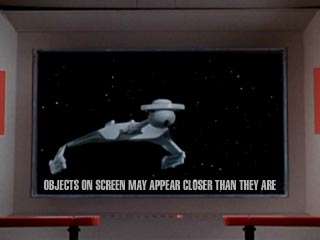Sci-Fi Writers Have No Sense of Scale
"Space is big. Really big. You just won't believe how vastly, hugely, mind-bogglingly big it is. I mean, you may think it's a long way down the road to the chemist, but that's just peanuts to space."
Dr. James Van Allen (for whom the Van Allen Radiation Belt is named) was once asked by a reporter to 'define space'. He replied, "Space is the hole that we are in."
Most people (if not, in fact, everyone) can't get their minds around just how big the universe is. So it should come as little surprise that most Speculative Fiction writers can't either. This is chiefly true of creators of TV, film, and video game SF. Creators of written science fiction can be positively obsessive about accuracy (but on the other hand, sometimes they're not). If your qualitative yardstick is based around an author's ability to describe distances, this may be a useful way to distinguish good print science fiction from bad print science fiction. And it's why a lot of science fiction fans don't like the movie and TV adaptations of their favorite books and stories. The usual blend of Adaptation Decay and Did Not Do the Research is a surefire way to leave the adaptation with no sense of scale. On the other hand, "Space is so ridiculously huge that there is absolutely no realistic way that anyone could ever travel to anywhere even remotely interesting in the lifespan of most major civilizations", while not a total deal-breaker, does rule out an awfully broad range of plots.
For example, consider that a light year is about ten quadrillion meters or nearly six trillion miles. That's ten-to-the-power-of-sixteen meters, or 10 petameters. Let's assume your family car uses about 2 and a half gallons of fuel per 100 km - about 25 mpg - and a gallon costs about US$4. Then one light year is roughly where you'd end up if you spent the entire national debt of the US on gas.[1] At the opposite end, an atomic nucleus is on the order of a quadrillionth of a meter. That's ten-to-the-power-of-negative-fifteen of a meter, or a femtometer. Such outrageous SI prefixes rarely appear in fiction, and that's before we get anywhere near the scales of galaxies and subatomic particles. If it sounds like a number made up by a child (Attention all yoctograms!, septillion seconds), the writer might have actually taken it seriously.
Another example which often comes up is the idea of beings coming to our galaxy from another galaxy. While there's no reason why a writer can't introduce beings from the nearest galaxy intent on contacting/conquering the Milky Way, there would have to be a pretty dang good reason to travel the incredibly vast distances separating galaxies—distances which make traveling between stars seem like a little hop.
Some would consider this one of the Acceptable Breaks From Reality. If the characters didn't travel through space at thousands of times the speed of light, it wouldn't be very interesting, unless the focus was just the spaceship itself. Either you'd have to make the ship incredibly powerful to max out Time Dilation and shorten the time spent from the characters' perspective, put the characters into some kind of suspended animation (and just fast forward through their journeys), or even have entire generations of characters that would live and die on the ship before they even reached a known extrasolar planet (meaning the audience would say They Wasted a Perfectly Good Character or treat the new generations as a Replacement Scrappy), and so on... If Star Trek, for example, was realistically scaled, it'd be a lot less interesting.[2]
A related trope is Medieval Stasis, where society stays the same for thousands of years. It is a subtrope of Space Does Not Work That Way, which features a list of tropes that try to treat space in a way that it wouldn't realistically work. See also: MST3K Mantra, Bellisario's Maxim, Watsonian Versus Doylist.
- No Sense of Distance
- No Sense of Time
- No Sense of Mass
- No Sense of Energy
- No Sense of Velocity
- No Sense of Units
